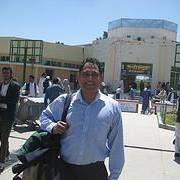As Mubarak continues to play for time and release statements offering to release protesters who have been, and are being, snatched off the streets and tortured in secret prisons, Professor Robert Springborg, Naval Postgraduate School and an expert on the Egyptian military, tell us that he believes the military's leadership is orchestrating the events, allowing attacks against the protesters by pro-Mubarak forces.
Springborg told the NY Times yesterday:
"Behind the scenes, the military is making possible the various forms of assault on the protesters. It's trying to secure a transition for itself. There's lots of evidence that the military is complicit, but for the most part Egyptians don't even want to admit that to themselves."
This is the military which at this moment is receiving $1.5 billion in U.S. military aid, which has now been threatened by Senator Patrick Leahy, powerful Chairman of the Senate subcommittee which must approve the aid, until Mubarak leaves. The assistance sits in a U.S. bank account and is used to settle export credits for continuing shipments of military hardware, but can be frozen by President Obama at any time. Also calling for a suspension of aid until Mubarak leaves the country as protesters have made their central demand are Rep. Gary Ackerman (D-NY,), Rep. Jim Moran (D-VA,) and Rep. Lloyd Doggett(D-TX.) Doggett said that the U.S. "must send the unmistakable message to Mubarak and all dictators who are watching our response that we will not continue to waste money propping up his tyranny."
The White House has already declared that it would suspend aid immediately if the military were to crackdown on peaceful protesters in the way of the Iranian Revolutionary Guard in 2009 or the Chinese military in 1989. The continuation of military aid has been conditioned on assurances to Admiral Michael Mullen, Chairman of the Joint Chiefs of Staff, by his Egyptian counterpart that the military would remain "neutral."
Meanwhile the repression continues unabated, despite the major media's focus on Mubarak's "concession" statements, which are viewed by some as the a buying of time before a true crackdown can be engineered. BBC News reported Thursday night that the government has settled on a low-intensity campaign of dropping protesters with snipers from a distance, sometimes using lasers to point targets out, singling organizers to be dragged from crowds, and continuing assaults on peaceful demonstrators. Another journalist died Friday, and more than 5,000 have been injured since Thursday night, according to NPR.
What is happening on the ground belies AP reports that Suleiman has "agreed not to hamper freedom of press and not to interfere with text messaging and Internet." In a tweet from CNN's Ivan Watson received within 2 hours of this writing, Watson reports that journalist are still being rounded up:
3 times Candy Crowley askd Egyptian PM why military police rounding up journos/human rights activists. 3 times he didn't understand question.
And putting a hollow ring to Obama's nearly daily exhortations to the Egyptian government that it must respect "freedom of expression" Medea Benjamin reported yesterday:
I was in the middle of buying some mints from a street vendor on Cairo's Talat Harb Street - right off Tahrir Square - when the rocks started flying. I had given a 20-cent coin to the vendor. He gave me one pack of mints, and all hell broke loose.
"Run, run," people yelled at me. I saw a group of men running down the street, carrying a man whose face was streaming with blood. Then I saw the pro-Mubarak thugs, armed with rocks, metal pipes, whips. "Run, Run," the Egyptians on the street told me. I ran for shelter as fast as I could. This has become a pattern the past few days. Thugs hired by the regime, many of them plainclothes police, try to create chaos on the streets just outside the entrances to Tahrir Square, the epicenter of the Egyptian revolution. They randomly attack people, including us foreigners. Many of us have been beaten, our cameras smashed.
Already there are signs that Mubarak does not intend to leave at all.
Today's AP:
Control of the square, or even a return to normal traffic of the area around it, would reinforce the government's message that it would remain in control of the country for the seven months leading to elections -- and that Mubarak need not resign as the opposition demands.
Prime Minister Ahmed Shafiq said on state television that stability was returning to the country and that large demonstrations like the one that took place at Tahrir Square on Friday would not succeed in forcing a regime change...
Some feared the relative calm was only a prelude to a show of force by the military...
(Note: You can view every article as one long page if you sign up as an Advocate Member, or higher).





